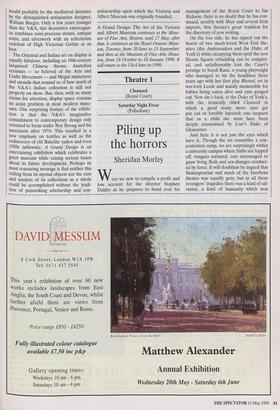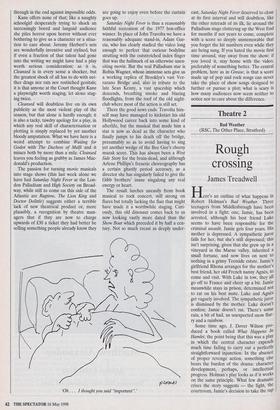Theatre 1
Cleansed (Royal Court) Saturday Night Fever (Palladium)
Piling up the horrors
Sheridan Morley
Were we now to compile a profit and loss account for the director Stephen Daldry as he prepares to hand over his management of the Royal Court to Ian Rickson, there is no doubt that he has con- tinued, notably with Mojo and several Irish imports, that theatre's great tradition for the discovery of new writing.
On the loss side, he has ripped out the hearts of two much-loved West End the- atres (the Ambassadors and the Duke of York's) while occupying them until the new Sloane Square rebuilding can be complet- ed, and unfathomably lent the Court's prestige to Sarah Kane, a young playwright who managed to hit the headlines three years ago with her first play Blasted, set in war-torn Leeds and mainly memorable for babies being eaten alive and eyes gouged out. Now she's back, at the Duke of York's, with the ironically titled Cleansed in which a good many more eyes get put out or forcibly injected; one suspects that as a child she must have been deeply traumatised by Lear's Duke of Gloucester.
And here it is not just the eyes which have it. Though the set resembles a con- centration camp, we are surprisingly within a university campus where limbs are lopped off, tongues tortured, rats encouraged to gnaw living flesh and sex-changes conduct- ed by force. It will doubtless be argued that Shakespearian and much of the Jacobean theatre was equally gory, but in all those revengers' tragedies there was a kind of sal- vation, a kind of humanity which won through in the end against impossible odds.
Kane offers none of that; like a naughty schoolgirl desperately trying to shock an increasingly bored and languid audience she piles horror upon horror without ever bothering to give us a character or a situa- tion to care about. Jeremy Herbert's sets are wonderfully inventive and stylised, but if even a fraction of that talent had gone into the writing we might have had a play worth serious consideration; as it is, Cleansed is in every sense a shocker, but the greatest shock of all has to do with nei- ther drugs nor rats nor restitched genitals; it is that anyone at the Court thought Kane a playwright worth staging, let alone stag- ing twice.
Cleansed will doubtless live on its own publicity as the most violent play of the season, but that alone is hardly enough; it is also a tacky, tawdry apology for a play, in which any real skill of characterisation or plotting is simply replaced by yet another bloody amputation. What we have here is a weird attempt to combine Waiting for Godot with The Duchess of Malfi and it misses both by more than a mile. Cleansed leaves you feeling as grubby as James Mac- donald's production.
The passion for turning movie musicals into stage shows (this last week alone we have had Saturday Night Fever at the Lon- don Palladium and High Society on Broad- way, while still to come on this side of the Atlantic are Ragtime, The Lion King and Doctor Dolittle) suggests either a terrible lack of new theatrical product or, more plausibly, a recognition by theatre man- agers that if they are now to charge upwards of £30 a ticket they had better be selling something people already know they are going to enjoy even before the curtain goes up.
Saturday Night Fever is thus a reasonably faithful recreation of the 1977 box-office winner. In place of John Travolta we have a reasonably adequate stand-in, Adam Gar- cia, who has clearly studied the video long enough to perfect that curious bodyline strutting with the outstretched index finger that was the hallmark of an otherwise unex- citing movie. But the real Palladium star is Robin Wagner, whose immense sets give us a working replica of Brooklyn's vast Ver- razano Bridge and, also in tribute to the late Sean Kenny, a vast spaceship which descends, breathing smoke and blazing floodlights, from the roof of the old night- club where most of the action is still set.
There the good news ends: Travolta him- self may have managed to kickstart his old Hollywood career back into some kind of afterlife, but the musical that made him a star is now as dead as the character who finally jumps to his death off the bridge, presumably so as to avoid having to sing yet another wedge of the Bee Gee's cheesy muzak score. This has always been a West Side Story for the brain-dead, and although Arlene Phillips's frenetic choreography has a certain ghastly period accuracy, as a director she has singularly failed to give the Gibb brothers' inane singalong any real energy or heart.
The result lurches uneasily from book musical to rock concert, still strong on flares but totally lacking the flair that might have made it a worthwhile staging. Curi- ously, this old dinosaur comes back to us now looking vastly more dated than the Show Boat which preceded it by half a cen- tury. Not so much recast as deeply under-
`Oh . . . I thought you said "important".'
cast, Saturday Night Fever deserved to close at its first interval and will doubtless, like the other retreads of its ilk, lie around the Palladium stage cluttering up the West End for months if not years to come, complete with a score so deeply unmemorable that you forget the hit numbers even while they are being sung. If you hated the movie first time around, stay away from the show; if you loved it, stay home with the video, preferably of something better. The central problem, here as in Grease, is that a score made up of pop and rock songs can never take the place of show songs designed to further or pursue a plot; what is scary is how many audiences now seem neither to notice nor to care about the difference.



























































 Previous page
Previous page